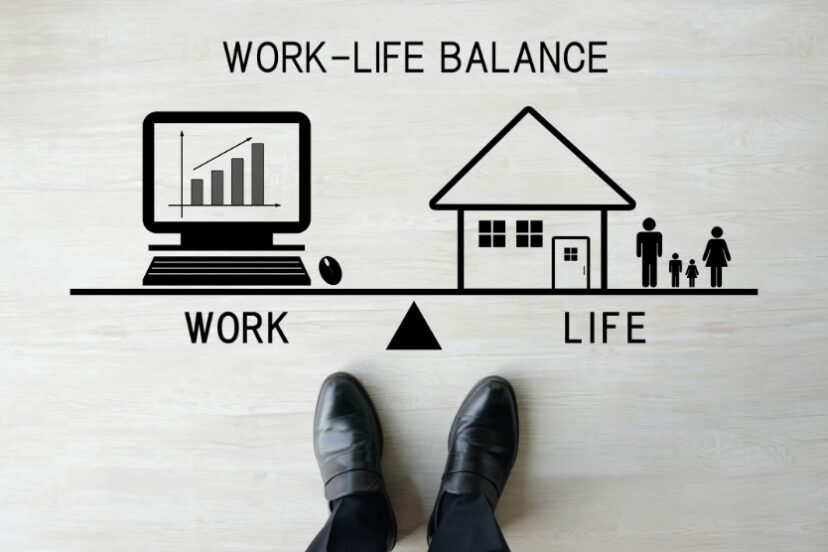Artificial Intelligence (AI) is no longer a futuristic idea—it’s here, shaping industries and changing how businesses…
10 Ways For Entrepreneurs To Achieve Work Life Balance

As an entrepreneur, the thrill of building and growing your business can be all-consuming, often making it difficult to step away.
However, maintaining a healthy work-life balance is essential for long-term success and personal well-being.
Striking the right balance between professional responsibilities and personal time can reduce stress, enhance productivity, and prevent burnout.
It’s the key to ensuring that you remain energized, focused, and passionate about both your business and your personal life.
By setting boundaries, prioritizing self-care, and making mindful choices, you can find harmony between your entrepreneurial ambitions and your personal needs.
This balance not only fosters a more fulfilling life but also positions you to achieve sustained success in your entrepreneurial journey.
1)) Set Boundaries
One of the most important ways to achieve work-life balance as an entrepreneur is to set boundaries between your work life and personal life.
This means establishing specific hours for work and sticking to them.
Make sure to also set aside time for yourself, family, and friends without any work distractions.
Tips for Setting Boundaries:
- Define Your Work Hours: Clearly outline the start and end of your workday. Stick to these times consistently to ensure there is a delineation between work hours and personal time.
- Use a Separate Workspace: Dedicate a specific area in your home or office for work-related activities. This helps create a mental barrier between work and personal life.
- Communicate Availability: Let your colleagues, clients, and family know your working hours and when you are available for meetings or calls. Setting expectations is essential to maintaining boundaries.
- Schedule Personal Time: Prioritize and schedule time for non-work activities such as exercise, hobbies, and spending time with loved ones. Treat these appointments with the same importance as work meetings.
- Turn Off Notifications: During non-work hours, disable work-related notifications on your phone and computer to avoid being tempted to check emails or respond to messages.
By implementing these tips, entrepreneurs can effectively set boundaries that distinguish their professional and personal lives.
Establishing these clear separations not only enhances productivity during work hours but also ensures that personal time is protected and valued.
This balance is crucial in fostering long-term success and well-being, allowing entrepreneurs to fully recharge and remain passionate about their business ventures.
2)) Prioritize Tasks
As an entrepreneur, it’s easy to feel overwhelmed by the never-ending list of tasks that need to be done. To achieve work-life balance, prioritize your tasks based on urgency and importance.
Focus on completing high-priority tasks first and delegate or eliminate low-priority tasks that are not essential.
Tips for Prioritizing Tasks:
- Identify High-Impact Tasks: Begin by pinpointing tasks that will have the most significant impact on your business. Focus on accomplishing these first to ensure that your efforts are directed toward meaningful progress.
- Use the Eisenhower Matrix: Categorize tasks using the Eisenhower Matrix by sorting them into four categories: urgent and important, important but not urgent, urgent but not important, and neither urgent nor important. This helps in deciding what to focus on first.
- Set Clear Goals: Break down your larger goals into smaller, actionable tasks. Establish deadlines and prioritize tasks that move you closer to achieving these goals.
- Delegate Responsibilities: Assign tasks that can be handled by others to free up your time for higher-priority activities. Trust your team to manage delegated tasks efficiently.
- Limit Time Spent on Low-Priority Work: Reduce the time and energy spent on tasks that have minimal impact on your business. Automate these tasks or allocate specific time slots to handle them, preventing them from taking over your day.
By prioritizing tasks effectively, entrepreneurs can ensure that their time and energy are spent on activities that drive their business forward.
This focused approach not only maximizes productivity but also reduces the stress of feeling overwhelmed by a lengthy to-do list.
Prioritizing tasks helps entrepreneurs maintain better control over their schedules, leaving more time for personal pursuits and fostering a healthier work-life balance.
3)) Delegate Responsibilities
As a business owner, it can be tempting to try to do everything yourself. Delegating responsibilities to employees or outsourcing certain tasks can help free up your time and allow you to focus on more important aspects of your business or personal life.
Tips for Delegating Responsibilities:
- Identify Tasks to Delegate: Evaluate your workload to determine which tasks can be delegated. Focus on repetitive, time-consuming tasks or those that do not require your specific expertise.
- Choose the Right People: Assign tasks to team members who have the skills and experience to complete them effectively. Ensure that they understand the objectives and expectations clearly.
- Provide Clear Instructions: When delegating, offer detailed guidance and necessary resources to complete the task. This helps prevent misunderstandings and sets your team up for success.
- Set Deadlines and Milestones: Establish clear deadlines and milestones to keep the task on track. Regular check-ins can ensure progress and address any issues promptly.
- Trust and Empower Your Team: Once you delegate a task, trust your team to handle it. Avoid micromanaging and offer support when needed. Empowering your team builds their confidence and competence.
By delegating responsibilities effectively, entrepreneurs can significantly reduce their workload and focus on high-priority tasks that drive their business forward.
This strategic approach not only enhances productivity but also fosters a collaborative and empowered team environment.
Mastering the art of delegation contributes to a more balanced and fulfilling professional and personal life.
4)) Take Breaks
Entrepreneurs need to take regular breaks throughout the day to recharge and avoid burnout. Schedule short breaks during the day to relax, clear your mind, or engage in activities that bring you joy.
Make sure to take longer breaks such as vacations or weekends to rest and rejuvenate.
Tips for Taking Breaks:
- Follow the Pomodoro Technique: Work for 25 minutes, then take a 5-minute break. After four cycles, take a longer break. This method helps maintain focus and productivity while ensuring regular rest.
- Step Outside: Spend some time outdoors during your breaks. Fresh air and natural surroundings can help clear your mind, reduce stress, and boost creativity.
- Engage in Physical Activity: Use your breaks to do some light exercises or stretches. Physical movement can reduce tension, improve circulation, and rejuvenate your body and mind.
- Disconnect from Work: During breaks, disconnect from work-related tasks and technology. Engage in a different activity, such as reading, listening to music, or chatting with a friend, to fully relax.
- Take a Power Nap: If you feel particularly tired, a short nap of 10-20 minutes can help refresh your mind and body, leading to increased alertness and better concentration for the rest of the day.
By incorporating regular breaks into their routine, entrepreneurs can maintain higher levels of energy and productivity throughout the day.
Taking breaks not only prevents burnout but also promotes mental clarity and creativity, which are essential for effective problem-solving and decision-making.
In the long run, prioritizing time for relaxation and rejuvenation contributes to a healthier, more sustainable work pace that supports both professional success and personal well-being.
5)) Practice Self-Care
Self-care is essential for maintaining a work-life balance as an entrepreneur. Make sure to prioritize activities that promote physical, mental, and emotional well-being such as exercise, healthy eating, meditation, hobbies, or spending time with loved ones.
Tips for Practicing Self-Care:
- Prioritize Physical Health: Engage in regular exercise, whether it’s a daily jog, gym workouts, or yoga sessions. Physical activity boosts energy levels, improves mood, and reduces stress.
- Eat a Balanced Diet: Focus on consuming nutritious meals that include a variety of fruits, vegetables, lean proteins, and whole grains. Proper nutrition fuels the body and mind, enhancing overall well-being.
- Establish a Routine for Relaxation: Allocate time for calming activities like meditation, deep breathing exercises, or reading. Regular relaxation practices can significantly reduce stress and improve mental clarity.
- Invest in Hobbies: Dedicate time to activities that you enjoy, whether it’s painting, gardening, playing a musical instrument, or any other hobby. Pursuing personal interests fosters creativity and provides a satisfying break from work.
- Connect with Loved Ones: Make time to bond with family and friends. Social interactions provide emotional support, enrich your life, and help balance your professional and personal commitments.
Pro-Tip: For busy entrepreneurs, investing in home gym equipment can be a game-changer for maintaining physical fitness and achieving work-life balance.
Having the convenience of a home gym eliminates commuting time to fitness centers, making it easier to integrate regular workouts into a hectic schedule.
It allows for flexible exercise routines that can be easily adjusted to fit into any part of the day, ensuring that physical health remains a priority.
A home gym can significantly reduce stress levels, boost productivity, and improve overall well-being, allowing entrepreneurs to thrive both personally and professionally.
By prioritizing self-care, entrepreneurs can ensure they maintain the physical, mental, and emotional resilience needed to navigate the demands of their business.
Incorporating regular self-care routines not only enhances personal well-being but also leads to improved productivity and creativity.
A balanced approach to self-care fosters longevity and satisfaction in both professional and personal realms.
6)) Learn To Say No
As an entrepreneur, it’s common to want to say yes to every opportunity that comes your way. Learning to say no is crucial for setting boundaries and avoiding overwhelm.
Evaluate each opportunity carefully and only say yes to those that align with your goals and priorities.
Tips for Learning to Say No:
- Assess Your Priorities: Clearly define your goals and priorities. Before committing to any request, evaluate whether it aligns with your long-term objectives and values.
- Set Clear Boundaries: Establish boundaries for your time and energy. Communicate these boundaries to colleagues and clients to manage expectations and protect your focus.
- Practice Polite Refusal: Develop a courteous yet firm way to decline requests. Saying something like, “I appreciate the offer but I’m not able to take on additional tasks at the moment,” can help you say no without creating conflict.
- Consider the Impact: Weigh the consequences of saying yes against maintaining your workload and well-being. If taking on a new task will lead to stress or compromise quality, it’s better to decline.
- Use Time to Decide: If unsure, buy yourself time to think. Politely ask for some time to consider the request before giving an answer, which can prevent hasty decisions you might regret later.
By mastering the art of saying no, entrepreneurs can safeguard their time, energy, and focus for what truly matters.
This skill enables them to commit to opportunities that align with their goals and values, leading to greater efficiency and fulfillment.
Learning to say no is not just about avoiding overwhelm, but also about creating space for growth and success in both professional and personal aspects of life.
7)) Create A Routine
Establishing a daily routine can help create structure in your life as an entrepreneur and ensure that you have time for both work and personal activities.
Set aside specific times for work tasks, meetings, self-care activities, meals, exercise, relaxation, and sleep.
Tips for Creating a Routine:
- Start with a Plan: Outline your daily tasks and responsibilities. Prioritize them and allocate specific time slots for each activity to ensure a balanced and productive day.
- Set Consistent Wake-Up and Bedtimes: Maintaining regular sleep patterns enhances both physical and mental health. A consistent schedule helps regulate your body clock, leading to better rest and more energy throughout the day.
- Incorporate Time Blocks: Use time blocking to dedicate specific periods for different types of work, personal activities, and relaxation. This method helps prevent burnout and ensures varied focus throughout the day.
- Include Breaks and Downtime: Schedule short breaks between work tasks and dedicate time for relaxation. Downtime is crucial for maintaining productivity and avoiding stress.
- Review and Adjust Regularly: Periodically assess your routine to identify what’s working and what’s not. Be flexible and willing to make necessary adjustments to optimize your efficiency and well-being.
By crafting a well-structured routine, entrepreneurs can strike a balance between their professional and personal lives.
A thoughtful routine not only enhances productivity and efficiency but also ensures time for relaxation and self-care.
Regularly reviewing and adjusting this routine allows for adaptability and sustained growth, leading to a harmonious and fulfilling lifestyle.
8)) Set Realistic Goals
Setting realistic goals can help prevent feelings of inadequacy or overwhelm as an entrepreneur trying to achieve work-life balance.
Break down larger goals into smaller achievable steps and celebrate your successes.
Tips for Setting Realistic Goals:
- Break Goals into Manageable Steps: Divide larger, overarching goals into smaller, attainable tasks. This makes the process less daunting and allows for gradual progression.
- Set Specific and Measurable Objectives: Clearly define what you aim to achieve and how you will measure success. Specificity and measurable criteria provide clarity and motivation.
- Be Realistic with Timelines: Establish timelines that are achievable and reasonable. Avoid setting overly ambitious deadlines that may lead to unnecessary stress and burnout.
- Regularly Review and Adjust Goals: Periodically assess your progress and be ready to adjust your goals as needed. Flexibility is key to staying on track and responding to changing circumstances.
- Celebrate Milestones: Acknowledge and celebrate small victories along the way. Recognition of progress boosts morale and keeps you motivated to continue working towards your larger goals.
By setting realistic goals, entrepreneurs can effectively manage their time and energy, reducing the risk of burnout and frustration.
Breaking down larger goals into manageable steps and celebrating milestones along the way fosters a sense of accomplishment and keeps motivation high.
This strategic approach ensures continuous progress and contributes to achieving a sustainable work-life balance.
Realistic goal setting is not just about meeting targets but also about nurturing growth and ensuring long-term success.
9)) Seek Support
Don’t be afraid to ask for help or seek support from friends, family members, mentors, or professional counselors as an entrepreneur striving for work-life balance.
Tips for Seeking Support:
- Build a Support Network: Surround yourself with a network of friends, family, and like-minded professionals who understand your challenges and can offer guidance and encouragement.
- Communicate Openly: Be honest about your needs and struggles with those close to you. Clear communication ensures that your support system understands how best to assist you.
- Seek Professional Advice: Consider consulting with mentors, business coaches, or counselors who can provide expert advice and strategies to help you navigate difficulties and achieve your goals.
- Join Community Groups or Forums: Participate in industry-specific groups or online forums to connect with others who share similar experiences. These platforms can offer valuable insights and support.
- Take Advantage of Resources: Utilize available resources such as workshops, seminars, and support programs designed for entrepreneurs. These resources can equip you with the tools and knowledge necessary for success.
By seeking support, entrepreneurs can alleviate the pressures of balancing work and personal life, knowing they are not alone in their journey.
Building a reliable support network, communicating openly, and utilizing professional advice can provide the encouragement and strategies needed to overcome challenges.
Participation in community groups and leveraging available resources further enriches the support system, promoting resilience and success.
Embracing support enables entrepreneurs to thrive both personally and professionally, fostering a sustainable and fulfilling lifestyle.
10)) Take Time Off
Make sure you schedule regular time off from work so you can completely disconnect from business-related matters allowing yourself some much-needed rest & relaxation which will improve productivity when you return refreshed & re-energized!
Tips for Taking Time Off:
- Schedule Regular Breaks: Plan and mark your calendar with regular intervals for breaks and vacations. Treat them as important appointments to ensure you commit to taking time off.
- Disconnect from Work Completely: When you take time off, make a conscious effort to unplug from work-related communications and activities. Avoid checking emails or answering work calls to fully rest and recharge.
- Engage in Relaxing Activities: Use your time off to participate in activities that you find relaxing and enjoyable. Whether it’s traveling, reading, or spending time in nature, choose activities that help you unwind.
- Set Boundaries with Work: Communicate your time-off plans to colleagues and clients in advance. Set clear boundaries about your availability to ensure that your time off is respected.
- Reflect and Recharge: Use your time off to reflect on your achievements and set new personal goals. Taking time to recharge can boost creativity, productivity, and overall well-being.
Taking time off is essential for maintaining a healthy balance between work and personal life.
By scheduling regular breaks, fully disconnecting from work, and engaging in relaxing activities, you allow yourself the necessary time to recharge and reflect.
Setting boundaries and communicating your plans ensures that your time off is respected, boosting your creativity and productivity when you return.
Embracing time off not only enhances your well-being but also contributes to long-term success and sustained performance.
Conclusion
Achieving work-life balance as an entrepreneur is not an easy feat, but it is certainly attainable with the right strategies in place.
By setting clear boundaries, prioritizing self-care, delegating responsibilities, and creating a structured routine, you can effectively manage the demands of your business without sacrificing your well-being.
Remember to be realistic with your goals, learn to say no when necessary, and seek support when you need it.
Taking regular time off to disconnect completely from work is also crucial to recharge and maintain your productivity in the long run.
Finding the perfect balance is an ongoing journey that requires consistent effort and self-awareness, but the rewards of a happier, more fulfilling life are well worth it.
With dedication and perseverance, you can harmonize your professional ambitions with your personal needs, leading to sustained success and overall satisfaction.





